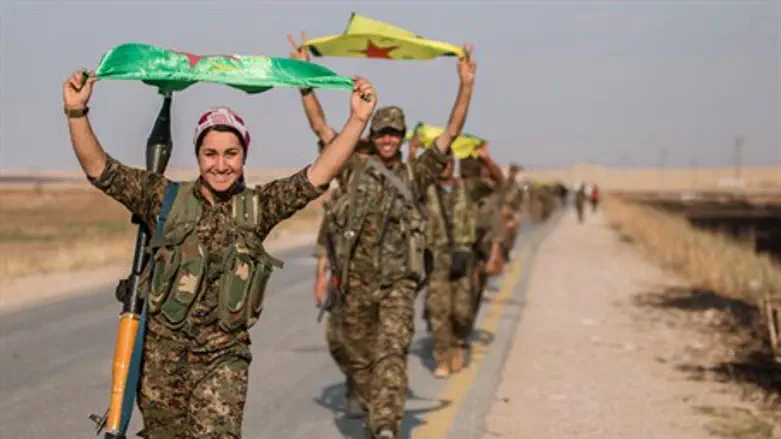
Syria's Kurds on Thursday declared a federal region in areas under their control in the north of the conflict-riven country, but both the government and an opposition coalition rejected the move.
The announcement is likely to anger neighboring Turkey and has complicated peace talks in Geneva aimed at ending the five-year civil war.
The United States, a key backer of Kurdish fighters in the battle against the Islamic State (ISIS) jihadist group, has also warned it would not recognize any self-ruled Kurdish region within Syria.
More than 150 delegates from Kurdish, Arab, Assyrian and other parties meeting in Syria agreed to create a "federal system" unifying territory run by Kurds across several Syrian provinces.
"We have given our blessing for the establishment of a federal system in Rojava (three Kurdish cantons) and northern Syria," said Aldar Khalil, a member of the conference's preparatory committee.
Sihanuk Dibo from Syria's leading Kurdish faction, the Democratic Union Party, said delegates to the conference "approved" the plan.
The announcement came on the second day of the meeting in Rmeilan, a border town in Syria's northeast Hasakeh province.
Kurdish parties already operate a system of three "autonomous administrations" in Syria's north, with independent police forces and schools.
The three cantons stretch along Syria's northern border with Turkey and are known as Afrin and Kobane, both in Aleppo province, and Jazire in Hasakeh province.
The Kurdish People's Protection Units (YPG), considered one of the most effective forces fighting ISIS, has cleared the jihadists from swathes of territory in those areas.
Turkey considers the YPG to be the Syrian affiliate of the Kurdistan Workers' Party (PKK), an outlawed group that has waged a decades-long insurgency against Ankara.
Regime, opposition object
The new "federal system" is expected to centralize governance in the three cantons under councils elected by the people.
Borders and other administrative details concerning the region would be discussed on Thursday, officials said.
They stressed the federal region would be based on "territorial" lines, not ethnicity, and that the move is not intended as a step towards full independence.
The Kurds, who represent about 15% of the Syrian population, have tried to avoid confrontation with the regime or non-jihadist rebels since the war broke out in 2011.
Even so, their declaration of a federal region has angered Syria's government and opposition.
Citing a foreign ministry official, Syria's state news agency SANA said the Kurdish announcement "has no legal basis and will not have any legal, political, social, or economic impact."
It said the move would "encroach on Syria's territorial unity."
The Istanbul-based opposition National Coalition warned in its own statement against "any attempt to form entities, regions, or administrations that usurp the will of the Syrian people."
"The shape of a Syrian state, central or federal, is not left to be decided by a single faction, sector of society, party, or movement - but should be decided after negotiations, with a new constitution and a popular referendum," the group said.
The High Negotiations Committee, the main opposition grouping which is involved in peace talks under way in Geneva, has also rejected a federal system for the country.
The PYD has not received an invitation to those talks, to its dismay.
"The Geneva talks will not succeed without us. We are on the ground, fighting Daesh (ISIS), protecting our region, and running its affairs," Kurdish delegate Aldar Khalil told AFP.
"All these factors make it difficult for us to fit into the Syrian equation. We are committed to a federal system," Khalil said.
US State Department spokesman Mark Toner said Wednesday that Washington "won't recognize any self-rule autonomous zones within Syria."
"This is something that needs to be discussed and agreed upon by the relevant parties in Geneva and then by the Syrian people themselves," he added.
Washington-based analyst Mutlu Civiroglu said the Kurdish announcement was a political message "to the United Nations, the US, Russia, and especially to Geneva, that if you ignore us, we are going to determine our future by ourselves."
AFP contributed to this report.